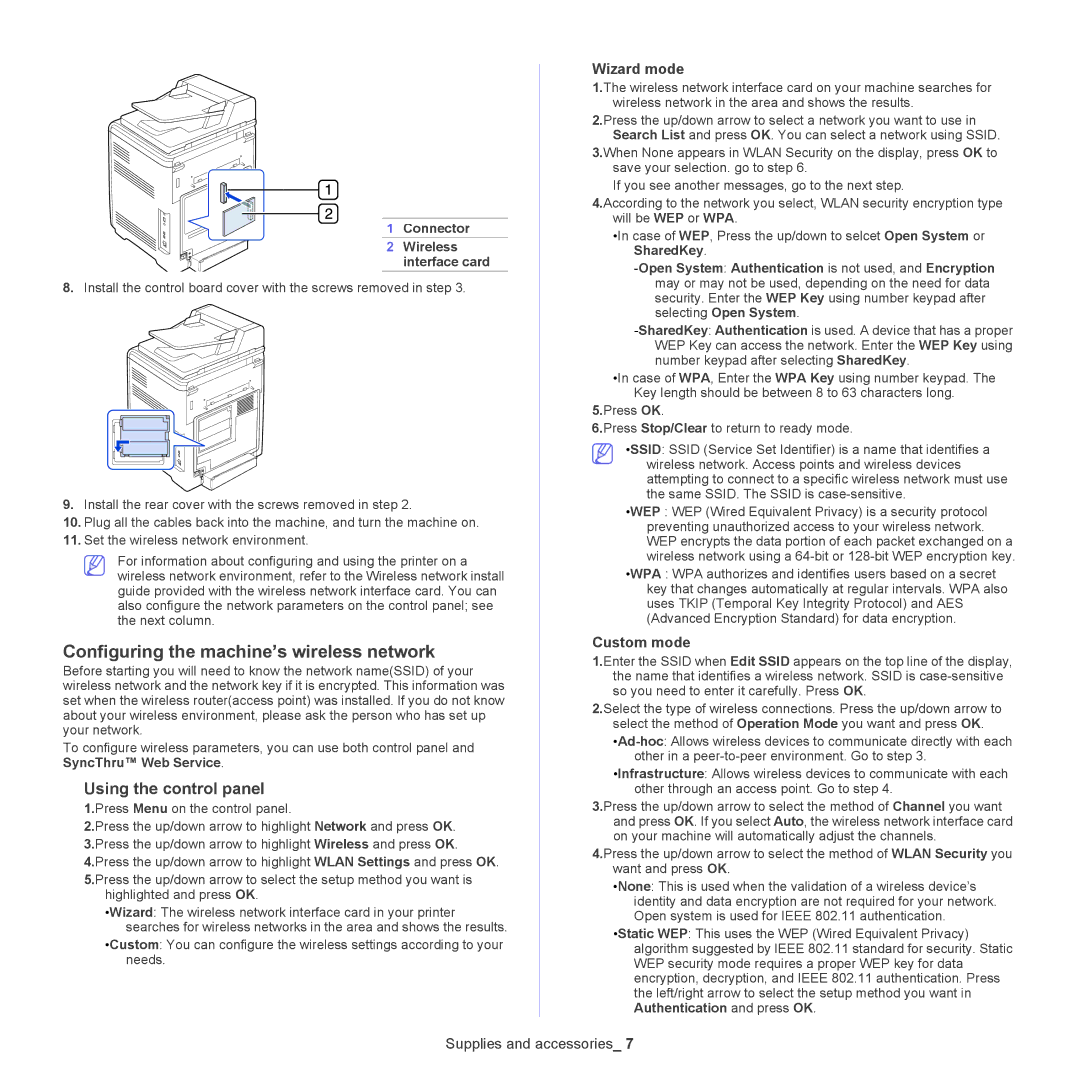
1 Connector
2 Wireless
interface card
8.Install the control board cover with the screws removed in step 3.
9.Install the rear cover with the screws removed in step 2.
10.Plug all the cables back into the machine, and turn the machine on.
11.Set the wireless network environment.
For information about configuring and using the printer on a wireless network environment, refer to the Wireless network install guide provided with the wireless network interface card. You can also configure the network parameters on the control panel; see the next column.
Configuring the machine’s wireless network
Before starting you will need to know the network name(SSID) of your wireless network and the network key if it is encrypted. This information was set when the wireless router(access point) was installed. If you do not know about your wireless environment, please ask the person who has set up your network.
To configure wireless parameters, you can use both control panel and SyncThru™ Web Service.
Using the control panel
1.Press Menu on the control panel.
2.Press the up/down arrow to highlight Network and press OK.
3.Press the up/down arrow to highlight Wireless and press OK.
4.Press the up/down arrow to highlight WLAN Settings and press OK.
5.Press the up/down arrow to select the setup method you want is highlighted and press OK.
•Wizard: The wireless network interface card in your printer searches for wireless networks in the area and shows the results.
•Custom: You can configure the wireless settings according to your needs.
Wizard mode
1.The wireless network interface card on your machine searches for wireless network in the area and shows the results.
2.Press the up/down arrow to select a network you want to use in Search List and press OK. You can select a network using SSID.
3.When None appears in WLAN Security on the display, press OK to save your selection. go to step 6.
If you see another messages, go to the next step.
4.According to the network you select, WLAN security encryption type will be WEP or WPA.
•In case of WEP, Press the up/down to selcet Open System or SharedKey.
•In case of WPA, Enter the WPA Key using number keypad. The Key length should be between 8 to 63 characters long.
5.Press OK.
6.Press Stop/Clear to return to ready mode.
•SSID: SSID (Service Set Identifier) is a name that identifies a wireless network. Access points and wireless devices attempting to connect to a specific wireless network must use the same SSID. The SSID is
•WEP : WEP (Wired Equivalent Privacy) is a security protocol preventing unauthorized access to your wireless network. WEP encrypts the data portion of each packet exchanged on a wireless network using a
•WPA : WPA authorizes and identifies users based on a secret key that changes automatically at regular intervals. WPA also uses TKIP (Temporal Key Integrity Protocol) and AES (Advanced Encryption Standard) for data encryption.
Custom mode
1.Enter the SSID when Edit SSID appears on the top line of the display, the name that identifies a wireless network. SSID is
2.Select the type of wireless connections. Press the up/down arrow to select the method of Operation Mode you want and press OK.
•Infrastructure: Allows wireless devices to communicate with each other through an access point. Go to step 4.
3.Press the up/down arrow to select the method of Channel you want and press OK. If you select Auto, the wireless network interface card on your machine will automatically adjust the channels.
4.Press the up/down arrow to select the method of WLAN Security you want and press OK.
•None: This is used when the validation of a wireless device’s identity and data encryption are not required for your network. Open system is used for IEEE 802.11 authentication.
•Static WEP: This uses the WEP (Wired Equivalent Privacy) algorithm suggested by IEEE 802.11 standard for security. Static WEP security mode requires a proper WEP key for data encryption, decryption, and IEEE 802.11 authentication. Press the left/right arrow to select the setup method you want in Authentication and press OK.
